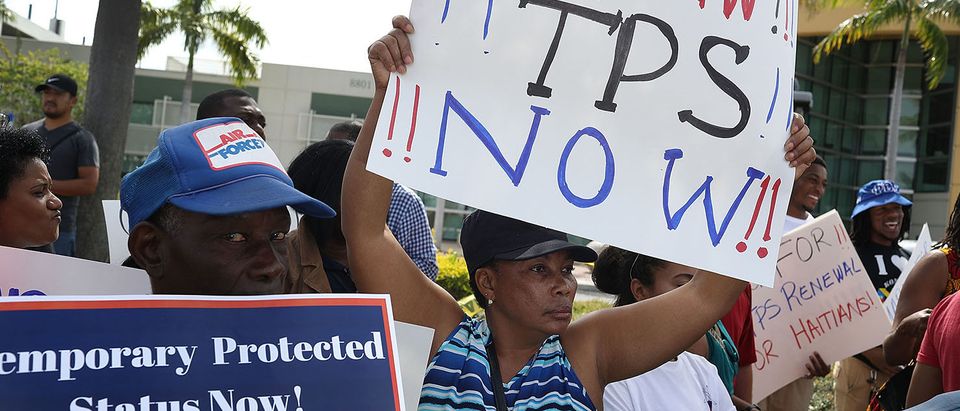Only in the stagnant swamps of Washington, DC, could a public policy with the word “temporary” in its title gain a sense of permanence, but that is exactly what has happened to Temporary Protected Status (TPS).
TPS was a benevolent policy enacted in 1990 to provide temporary safe haven to those who were visiting or temporarily living in the United States – such as tourists or students – when civil strife or a natural disaster suddenly struck back home, making their immediate return either very difficult or dangerous.
Consider a situation where your neighbor’s house floods and you offer the comforts of your living room to the displaced family so they have somewhere safe to live while their home is being repaired. Except in the case of TPS, the people residing in your living room never go home. And they invite their family members, who are not even in the U.S. yet, to move in as well.
The near permanence of TPS can be seen by considering the fact that today, there are more than 400,000 TPS recipients from ten countries in the United States. A large number of these recipients are from Central America, and received TPS at the turn of the century – roughly 20 years ago – due to the damages inflicted by Hurricane Mitch. Not one of these countries was a paradise before the hurricane struck, and they aren’t likely to become a paradise if we extend TPS for another 20 years. But the countries have had decades to recover and their displaced citizens should return home.
In addition to its failure to be temporary, TPS has other problems as well. For many, it became a magnet for illegal immigration. Once a country was granted TPS, for example, those wishing to reside in the U.S. and obtain coveted work permits simply rushed the borders, knowing that they would likely be able to benefit from the quasi-permanent protected status like many of their fellow countrymen.
Early on, the Trump administration recognized the inherent problems with TPS and moved to restore its original objective and integrity by ending the status for those who had been here for decades and whose countries had sufficient time to heal. Unfortunately, activist judges immediately issued injunctions, ensuring TPS would remain in place for the countries in question.
The problem with never sending home TPS recipients is that it tells the American public that the policy has no credibility. Allowing someone to remain here temporarily because of a sudden disaster back home is not a promise of permanent residence, nor is it path to citizenship. It is a short-term offer of humanitarian assistance. If the public loses faith in the credibility of the program because beneficiaries never go home, then the ability of Congress to extend this program to future populations could be called into question.
Thankfully, and to the surprise of many who long ago had given up on a sensible immigration-related ruling coming out of the Ninth Circuit Court of Appeals, the court recently overruled the lower courts and cleared the way for the Trump Administration to end TPS for four nations: El Salvador, Haiti, Nicaragua and Sudan.
This momentous ruling is not only a win for the American people, but for the rule of law, while also serving as a strong rebuke to activist judges who have decided that they have the authority to make immigration policy from the bench.
The decision affirms two very important aspects of TPS. First, it reminds its recipients that the “T” in TPS stands for temporary, and that they should never have the expectation that they will be staying here long term or that they are on a path to citizenship.
The second aspect of the ruling that is of critical importance is that it affirms that the Department of Homeland Security, along with other relevant federal agencies, has clear and unambiguous authority and discretion to oversee the program and decide when those who are benefitting from TPS should return home.
Prior to this ruling it could be argued that TPS should be abolished all together because it couldn’t be administered and enforced in the way it was intended. Now, perhaps, the courts have shown us that this humanitarian policy just might be able to work after all. Perhaps the swamp is actually changing.
Dave Ray is director of communications at the Federation for American Immigration Reform (FAIR), a nonprofit group advocating for legal immigration.


